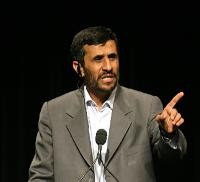As the United States debates just how much more effort it wants to put into the Afghanistan-Pakistan sinkhole, evidence mounts of the need to pursue a strategic pivot back toward the Middle East, where the Arab Spring is increasingly threatened by a Persian winter of revolutionary discontent. For some time now, Iran has been showing signs of mounting internal divisions between competing hardline factions led by President Mahmoud Ahmadinejad and the Supreme Leader Ayatollah Ali Khamenei. But it has also become more desperate about asserting its alleged leadership of the region's ongoing wave of uprisings, including a far more active sponsorship of al-Qaida's Persian Gulf franchise. All this suggests that, if America is truly serious about continuing the fight against the post-Osama bin Laden al-Qaida, then Washington needs to admit that the center of gravity in that "persistent struggle" has shifted out of northwest Pakistan and into the Persian Gulf.
First, the backstory on Iran's current infighting: Ahmadinejad has made no secret of his desire to create a president-centric single-party dictatorship in Iran -- the clerical elite be damned. After the 2009 presidential election, when the voting fraud committed on Ahmadinejad's behalf by the Iranian Revolutionary Guard Corps (IRGC) became apparent, the opposition Green Movement spontaneously reared its angry head in a clear precursor to today's Arab Spring. In response, Ahmadinejad & Co. basically staged a military putsch, with the blessing of the clearly unnerved Khamenei.
Since that time, Ahmadinejad has gone out of his way to marginalize the clerical elite, even going so far as to propose, through his controversial ally First Vice President Esfandiar Rahim Mashaei, that the Iranian version of the Shiite faith is so unique and direct in its spiritualism that ayatollahs are basically superfluous. Adding religious insult to political injury, Ahmadinejad's camp has even insinuated that his presidency may well trigger the return of the Hidden Imam, a quasi-messianic figure for Shiite Muslims.

